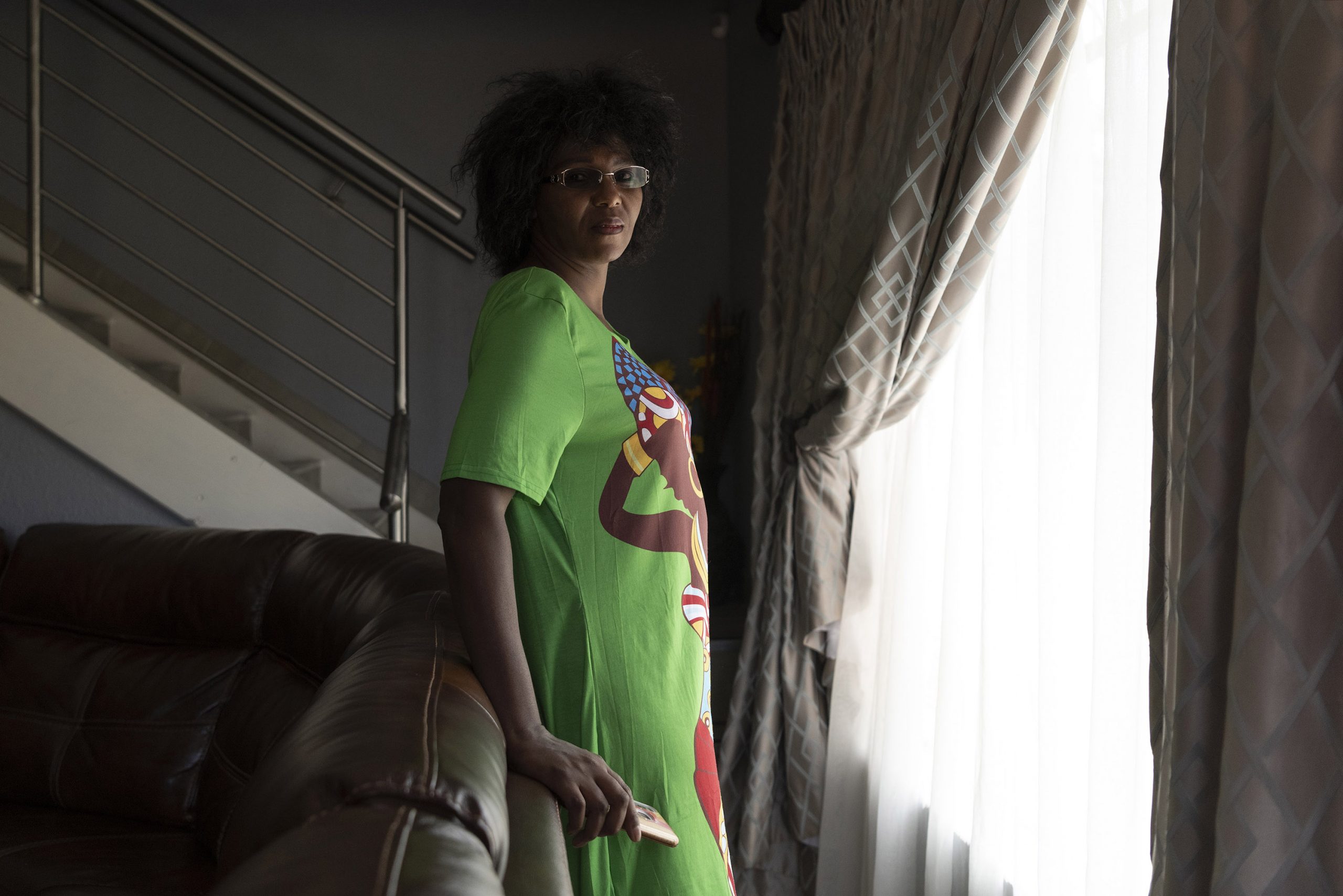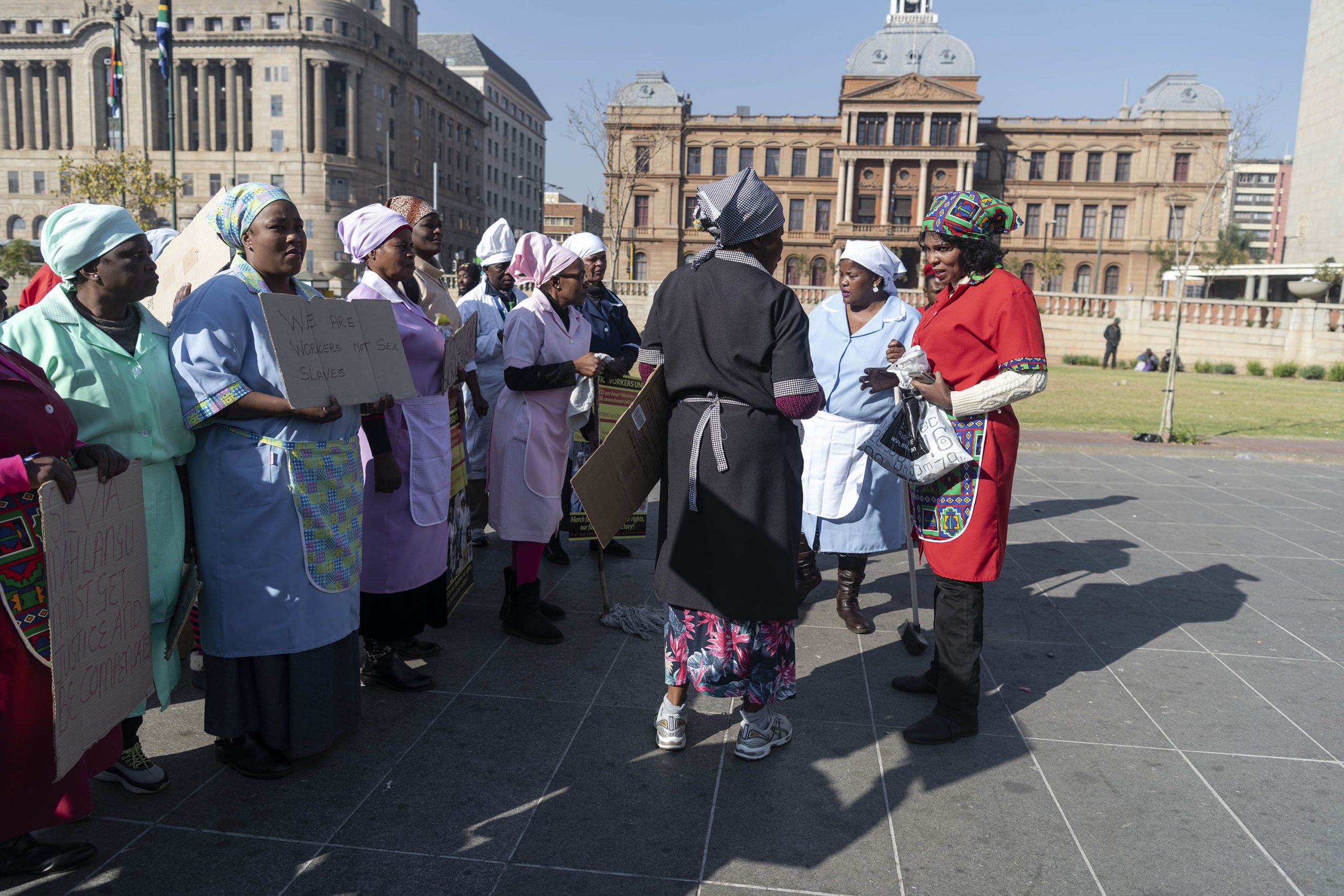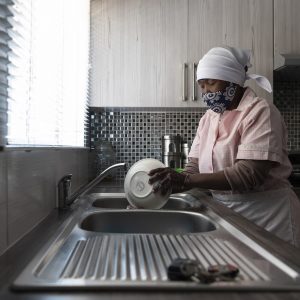Pinky Mashiane’s fight for all domestic workers
The founder of the United Domestic Workers of South Africa talks about how she got into activism and her plans to help domestic workers who lost their jobs because of Covid-19.
Author:
2 November 2020

“It was the experience of seeing a big white man scared of me that inspired me to fight for domestic workers, and I have never looked back ever since,” says Pinky Mashiane, the founder of United Domestic Workers of South Africa (Udwosa), recalling a life-changing encounter in early 2000.
Her bravery and tenacity fuels her passion to fight for the rights of domestic workers. For her efforts, she was awarded a leadership scholarship by the Nelson Mandela Foundation.
The plight of domestic workers is a cause that’s close to the heart of Mashiane, 49, which is why she has spent the better part of her life fighting for their advancement. Born in Phola in Mpumalanga, she was the only child of Esther Mashiane, who died in November 1998. At the time, Pinky was pregnant with her daughter Tsepang.
Mashiane was raised by her grandparents Alfred and Khethiwe Mashiane, who lived on a farm in Kriel, a small farming town in Mpumalanga. She only met her father when she was 23.
“My grandmother and grandfather were both domestic workers,” says Mashiane.
Related article:
Tears well up in her eyes as she recollects her time in lower primary school, which she started in 1978. “There was a time when I didn’t have a school uniform,” she says.
“I used to wear my uncle’s black shirt and my grandfather’s grey shirt when I was at Mgibe Primary School in KwaNdebele. I would go to school without anything to eat and play netball during lunch breaks.
“When I was wearing my grandfather’s shirt, some classmates would laugh at me saying that I was wearing my uncle’s shirt. Deep down I said at least they thought it was my uncle’s, and I didn’t tell them that in fact that one was my grandpa’s,” says Mashiane with a lump in her throat.
Her relationship with her mother was not one of which she is proud. “She only came home when she wanted to. The situation was so bad that I couldn’t even call her mom. I used to call her mam’khulu (a mother’s older sister), it was sad and inside I felt anger towards her.”
A desire to help people
In 1982, Mashiane and her grandparents moved to KwaNdebele in search of a better life. Financial circumstances forced her to drop out of school in grade 10 so that she could help the family.
“In primary school, when they asked us what we wanted to be, I said I wanted to become a nurse. But later I changed my mind and wanted to be a social worker. I knew one thing and that is that, I wanted to help people.”
But these hopes and dreams were not within reach for Mashiane, who was forced to take her first job as a domestic worker in Kriel. Working three days a week, she was able to take some of her R110 salary home to help her family.

“I hated the job because I was still young and I knew that I did not belong there because this was not my dream job.”
Mashiane’s reunion with a former school teacher changed her life. “I stayed in the house with the family and even though I was a domestic worker, they treated me like a member of the family. Mrs Mokoena was the first person that I called mom because she took the role of a mother,” she said.
Mashiane used this time to further her education in the hope that she could break the cycle of domestic workers at home. She began doing her matric by correspondence at Damelin and later found a job in a crèche in Bedfordview in Johannesburg.
Becoming an activist
Mashiane’s journey to being an activist started on a train trip to work in 2000. “I was standing while carrying my daughter because the train was full and a woman said to me that I should rather go to the comrades’ coach, because comrades would never let a woman stand while she is carrying a baby in the train.”
One day Mashiane did just that and the experience changed the course of her life. “I heard them speaking about workers’ rights and that there would be a meeting about domestic workers. I attended the meeting and I was touched by the fact that women could not write their own names because they did not get an education, and that is when I started working with the South African Domestic Service and Allied Workers Union.”
Once she joined the union, she started educating herself about labour law. In 2001, she put into practice the skills she was taught at the union offices when she saw an employer beating up an elderly man who worked for him.
Related article:
“I was so angry that I started shaking. I walked through the gate and confronted the man. He said, ‘Wat soek jy (What do you want)?’ I told him that I wanted to know which clause he used to punish the man, and he changed his attitude,” says Mashiane, who at the time was masquerading as a labour law inspector.
Mashiane threatened to call the minister of labour. “He called me inside and wanted to give me R1 000 and I told him to give it to his domestic worker that he had just beaten up. The colour on his face turned pink and he gave the money to the old man.”
It was this experience of “seeing a big white man scared of me [that] inspired me to fight for domestic workers”.
Confronting domestic workers’ challenges
Fast-forward to 2020 and Mashiane is still fighting for better treatment of domestic workers, even though she now works as a porter in the theatre of a private hospital in Pretoria. On 15 June 2018, she formed Udwosa.
“I told myself that something needs to be done and I am the person to do it. We started with 200 domestic workers and today we have about 600.”
Most of the cases that she deals with relate to the minimum wage, working hours, non-compliance, the registration of domestic workers with the Unemployment Insurance Fund and contract negotiation, along with the racial, verbal, physical and mental abuse of domestic workers.
“The main reason why this happens is because some employers do not consider domestic work as formal employment and there is no oversight in the sector. In South Africa, some employers, from all races, are ill-treating their domestic workers. Especially those who are from other countries. I want it to be known that my struggle for domestic workers is not for only South African domestic workers. It also includes migrant domestic workers,” she says vehemently.

The Covid-19 pandemic has heavily affected domestic workers, with a number of them losing their jobs. According to Statistics South Africa’s latest Quarterly Labour Force Survey, released on 29 September, more than 250 000 domestic workers have lost their jobs since the beginning of the pandemic.
“It breaks my heart that so many domestic workers have lost their jobs. But I also question as to how they arrived at such a high number because, during lockdown, domestic workers could not go to the CCMA [Commission for Conciliation, Mediation and Arbitration], couldn’t go to the labour department and do not have access to the internet,” she says.
Mashiane wants secure income for domestic workers who have lost their jobs and the wages that come with it. Part of the plan is approaching the government and asking for the allocation of vacant land to domestic workers so that they can use it to plant vegetables.
“If we had done this before the pandemic, maybe domestic workers who lost their jobs wouldn’t have suffered that much,” she says.



